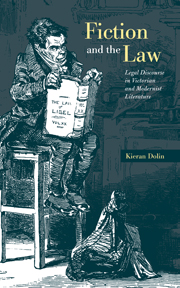Book contents
- Frontmatter
- Contents
- Acknowledgments
- 1 Narrative forms and normative worlds
- 2 The modern Western nomos
- 3 True testimony and the foundation of nomos – The Heart of Midlothian
- 4 Reformist critique in the mid-Victorian “legal novel” – Bleak House
- 5 Representation, inheritance and anti-reformism in the “legal novel” – Orley Farm
- 6 Power, chance and the rule of law – Billy Budd, Sailor
- 7 From sympathetic criminal to imperial law-giver – Lord Jim
- 8 Freedom, uncertainty and diversity – the critique of imperialist law in A Passage to India
- 9 Settling out of court
- Notes
- Index
6 - Power, chance and the rule of law – Billy Budd, Sailor
Published online by Cambridge University Press: 18 December 2009
- Frontmatter
- Contents
- Acknowledgments
- 1 Narrative forms and normative worlds
- 2 The modern Western nomos
- 3 True testimony and the foundation of nomos – The Heart of Midlothian
- 4 Reformist critique in the mid-Victorian “legal novel” – Bleak House
- 5 Representation, inheritance and anti-reformism in the “legal novel” – Orley Farm
- 6 Power, chance and the rule of law – Billy Budd, Sailor
- 7 From sympathetic criminal to imperial law-giver – Lord Jim
- 8 Freedom, uncertainty and diversity – the critique of imperialist law in A Passage to India
- 9 Settling out of court
- Notes
- Index
Summary
Found a family, build a state,
The pledged event is still the same:
Matter in end will never abate
His ancient brutal claim.
This is the first of the two quatrains which comprise Herman Melville's 1891 poem, “Fragments of a Lost Gnostic Poem of the 12th Century.” With its ellipticism and claim of incompletion, its scepticism and enigmatic wisdom, it affords a means of changing floors in “the house of fiction, ” from the large public rooms of Orley Farm to the cramped, secret quarters of Billy Budd. With Melville's novella we leave behind the narrative amplitude and sensus communis of Victorian realism for the compression and “indirection” of much Early Modernist fiction. This movement towards dramatic intensity is neatly captured in the poem's opening, “Found a family, build a state,” which condenses into a single line a metonym developed by Scott, Dickens and Trollope for the novelistic representation of growth, decay, continuity and change in the nomos. The reconstitution of family in the conclusions of The Heart of Midlothian, Bleak House and Orley Farm serves as a cell of normative hope, of the possibility of reasonable reform, in a body politic variously conceived as disabled by history, institutional sclerosis or unenlightened self-interest. However, this residual optimism is denied in the second half of the poem, as what is “pledged” by the establishment of nomos is not the transformation of ideal into actuality, spirit becoming flesh in a radically altered future, but “matter” reasserting “its ancient brutal claim.”
- Type
- Chapter
- Information
- Fiction and the LawLegal Discourse in Victorian and Modernist Literature, pp. 121 - 144Publisher: Cambridge University PressPrint publication year: 1999



